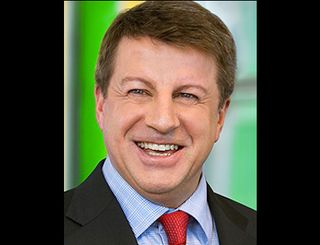Lougee: Give Broadcasters a Chance

"We’re asking policymakers to stop treating us on one hand as if we’re too big and powerful and then in another context treat us as dinosaurs. We are neither."
That was one of the messages from Gannett Broadcasting president and National Association of Broadcasters TV board member David Lougee to a Media Institute lunch crowd in Washington Friday. "Our industry is under the thumb of government regulations—many of which have been in place for many decades—that were based on a very different marketplace," he said.
Broadcasters have been trying to pitch the FCC on the value of broadcasting vis-à-vis the wireless players getting a helping hand from the commission.
Lougee called it "a bit entertaining" to hear complaints about Gannett's recent merger with Belo, which drew critics predicting it would create a behemoth wreaking havoc on competition and localism in light of the size and scope of an AT&T or Verizon.
"Whereas those companies advertise that they reach consumers from coast to coast, FCC rules prohibit any one TV broadcaster from reaching more than 39% of all American households," he said. "Put differently, the rules in place force us to be different and inhibit us from being an equal competitor to the wireless industry. I am not here today to offer a judgment on whether those rules are good or bad, but merely to highlight their existence."
Lougee also wanted to highlight the real costs of programming being unfairly laid at the feet of broadcast retrans deals.
He said Detroit's Miguel Cabrera just got a $292 million contract. Where does that money come from, he asked? "That $292 million, folks, is all subscription fees for a regional sports network on cable and satellite....Broadcasters are not the reason for skyrocketing cable bills. Even though the four major affiliates in each market represent more than 35% of all cable viewing on a cable or satellite system, we still barely get 10% of the fees. Meanwhile those sports channels get a fraction of our viewers but dramatically higher fees that are skyrocketing."
Broadcasting & Cable Newsletter
The smarter way to stay on top of broadcasting and cable industry. Sign up below
He said instead of the "broadcast fee" cable operators are "calling out" in their bills, there should be a "sports fee."
Lougee provided some words of caution about the incentive auction. He said he had "serious reservations" about some on the current dynamics.
"As more and more people begin to question whether enough broadcasters will participate in the auction, there’s been a parade of items that either place additional burdens on broadcasters or even some that would remove essential protections against pay-tv providers [that] have been working their way out of the agency," he said.
The FCC just this week voted to limit TV JSAs and prevent coordinated retransmission consent negotiations among top TV stations in a market.
He said the FCC should not be singularly focused on trying to get as much spectrum back as possible. "The commission can’t let the pressure and politics of a successful near-term auction do long-term damage to the lifeblood of America’s local communities," he said.
Lougee also warned the FCC to, in effect, worry about getting the auction right, rather than just getting it done.
For example, he said, the commissioner during the 2009 DTV transition had projected Gannett's WUSA TV Washington would need 12 KW of power to replicate its analog signal in digital. "Well, when we lit up they couldn’t even see our signal at the CBS News Bureau on the Hill. It turns out we needed 56 KW—not 12."
Lougee urged broadcasters to innovate more, but said it needed a stable regulatory environment. He also pitched broadcasters a force to promote that "competition, competition, competition" FCC chairman Tom Wheeler celebrates.
"Who is going to compete with and hold accountable the wireless and cable industries? As they increasingly consolidate – we are seeing names like Time Warner Cable, MetroPCS and others disappear before us – who will take them on..."
Broadcasters are a key part of that, he said, and the FCC ignores that at its peril. "I fear that the FCC tends to view broadcasters as yesterday’s news. That would be a major mistake."
Contributing editor John Eggerton has been an editor and/or writer on media regulation, legislation and policy for over four decades, including covering the FCC, FTC, Congress, the major media trade associations, and the federal courts. In addition to Multichannel News and Broadcasting + Cable, his work has appeared in Radio World, TV Technology, TV Fax, This Week in Consumer Electronics, Variety and the Encyclopedia Britannica.

